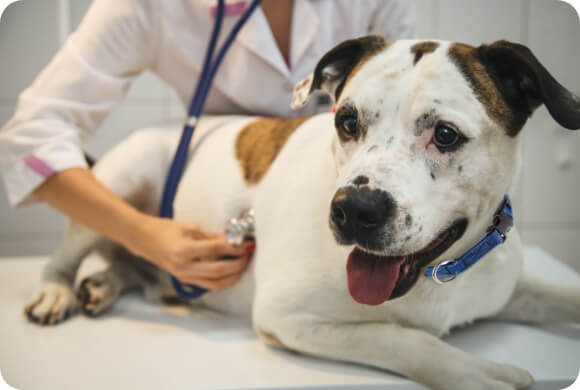

Kennel Cough
Canine infectious respiratory disease complex (CIRDC), commonly known as kennel cough, is a respiratory disease characterized by a deep, dry, honking cough. This disease is extremely contagious and has numerous causative agents, including the bacteria Bordetella bronchiseptica and the canine parainfluenza virus. CIRDC is usually considered mild but may cause some discomfort. For otherwise healthy dogs, the condition tends to resolve on its own within a week or two. However, in young puppies, senior dogs, or dogs with weakened immune systems, the infection can descend into the lungs and cause serious issues such as chronic bronchitis or pneumonia.
Dogs can contract CIRDC in places where groups of dogs congregate, such as shelters or boarding facilities. Medications to treat the cough may be prescribed, and many dogs do well with treatments that can be managed at home. Your veterinarian will also likely advise you to keep your dog away from other dogs until the infectious stage has passed.
You can help prevent the risk and severity of CIRDC by ensuring your pet’s Bordetella vaccine is up to date. As always, talk to your veterinarian if you have questions or concerns about CIRDC.
Tracheal collapse can cause a dry, honking cough and results when the rings of cartilage that form the trachea (windpipe) lose their strength. This condition can cause tracheal rings to flatten when inhaling.
The cough can become more pronounced at different times including:
- • When eating or drinking
- • During periods of excitement
- • At night
- • In hot weather
- • When the trachea experiences pressure from a collar around the neck
Certain breeds are more susceptible to tracheal collapse than others. These include: Chihuahuas, Pomeranians, Shih Tzus, Toy Poodles, and Yorkshire Terriers.
In order to diagnose a collapsing trachea, your vet may apply light pressure to the trachea. If your dog coughs or has difficulty breathing, further investigation using x-rays, endoscopes, or bronchoscopes may be necessary.

Heart Disease
Coughing can be a symptom of heart disease. Heart disease is the thickening or weakening of the heart valve or muscle and results in the failure to pump blood efficiently. Numerous causes of coughing include heart enlargement compressing airways, increased pressure within the lungs, or fluid accumulation in the lungs.
Other symptoms of heart disease include:
- Fainting or collapsing
- Lethargy and fatigue
- Difficulty breathing
If a vet suspects the presence of heart disease, tests may include chest x-rays, an electrocardiogram (ECG), an echocardiogram, and blood tests.
Several breeds are especially susceptible to heart disease, including Cavalier King Charles Spaniel, Great Dane, and others.
Heartworm disease can also cause coughing in dogs. This is a serious condition that can be fatal if left untreated. Heartworms can be transmitted by a single bite from an infected mosquito. The heartworm larvae then migrate to the heart and lungs where they begin to mature and grow, causing inflammation of the blood vessels and lungs.1
Other symptoms of heartworm disease include:
- • Lethargy
- • Weight loss
- • Swollen belly
- • Difficulty breathing
You can help prevent heartworm disease by administering a monthly heartworm preventive medication. The actual treatment of heartworms in dogs can be expensive as well as uncomfortable for your pet.2 Even with treatment, heartworm infection can cause permanent damage to the heart and lungs. That’s why it’s so important to keep your dog on monthly heartworm prevention all year long to help ensure a long, healthy life.

What To Do if Your Dog Is Coughing
If your dog is coughing, call your vet. Though many of the above ailments are treatable, they all require medical attention. Never try to diagnose your dog yourself. Be on the lookout for other symptoms to give your vet a full picture of what is happening. Your vet will most likely perform a physical examination alongside other diagnostic tests such as x-rays and blood tests. The sooner your veterinarian examines your dog, the sooner they can address the cause. This can be especially important for some conditions such as heartworm disease or heart conditions.
Treating Your Dog’s Cough
After the vet determines the cause of your dog’s cough, or rules out some causes, they will discuss treatment plans with you. Depending on the condition, treatments can include cough suppressants, antibiotics, steroids, or even surgery.
References
- 1. Heartworm Basics. American Heartworm Society. Accessed August 17, 2022. www.heartwormsociety.org/pet-owner-resources/heartworm-basics.
- 2. Weigh the Costs. American Heartworm Society. Accessed August 17, 2022. https://d3ft8sckhnqim2.cloudfront.net/images/infographics/0010-weigh-the-costs.jpg.
Related Articles


Canine infectious respiratory disease complex (CIRDC), known to many dog owners as kennel cough, is a highly contagious respiratory...


Regular vet visits are essential to keep your dog healthy. But just how often do you need to go?...


Congratulations on your new puppy! Understandably, adding a new dog to your home is accompanied with some questions...



